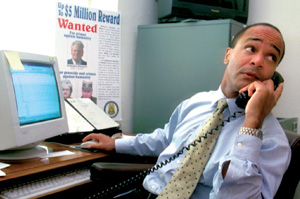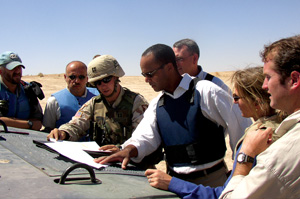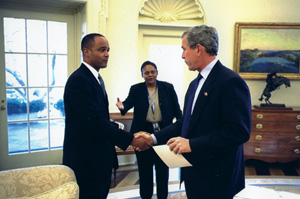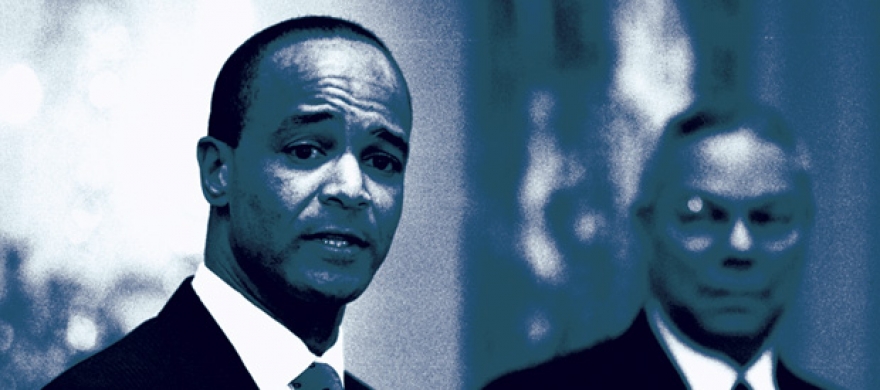Ambassador of Hope
Pierre-Richard Prospers (JD 89) roles as U.S. ambassador thrust him into the public eye, but its his current position as partner at Arent Fox that has allowed him to tackle high-profile cases with diplomatic connections on a private level.
When Pierre-Richard Prosper was given the choice to serve as a deputy district attorney in either Torrance or Compton, it was then head deputy of Torrance Gil Garcetti who advised Prosper to “go to Compton.” It was 1989. Gang violence had hit an all-time high in the city. Even Prosper, who was hungry for a challenging legal environment, couldn’t have imagined what the next three years would bring.
There was 1991, for example. After just two years on the job, Prosper found his caseload
to include some of the more than 100,000 known active gang members living in Los Angeles,
and nearly 800 of the gang-related homicides that they had been a part of. His keen negotiating skills have played a large role in Prosper’s success. “I draw
on every skill I’ve learned,” Prosper said. “Law is an evolving and ever-changing
landscape, and you have to be willing to take risks to seek justice.”
His keen negotiating skills have played a large role in Prosper’s success. “I draw
on every skill I’ve learned,” Prosper said. “Law is an evolving and ever-changing
landscape, and you have to be willing to take risks to seek justice.”
Then came April 29, 1992, the day the Rodney King verdict was announced. Riots broke
out and chaos ensued. And in the middle of it all was Prosper and the district attorney’s
office.
“The violence was everywhere,” Prosper said. “We even had to evacuate the courthouse.”
The riots lasted six days, but the cases carried on for years. When Prosper left his
role with the DA in 1994, he had 22 cases as part of his workload. All murder, double
murder, and triple murder.
“This was major crime we were dealing with,” Prosper noted. “Recovering from those
riots was no easy task.”
Prosper’s career beyond the DA’s office, though more complex, mirrors the same dedication
to service that he held as a young prosecutor on Garcetti’s team. His titles have
changed (most now address him as Ambassador Prosper), and his client base has broadened,
but at the end of the day his sights remain set on the hunt for justice. Prosper was among the first to set foot on Afghan and Iraqi soil after the World
Trade Center was attacked in 2001.
Prosper was among the first to set foot on Afghan and Iraqi soil after the World
Trade Center was attacked in 2001.
It is a hunt that has most recently led Prosper to fight for two American citizens
imprisoned by the Iranian government. With one verdict in favor of his client, and
another still pending, Prosper is acutely aware that the weight of each man’s freedom
is on his shoulders. He welcomes the challenge with humility, and with clientele that
know if anyone can do it, it’s Prosper.
One Million People in 100 Days
Prosper’s efforts in Compton hadn’t gone unnoticed, and he left the district attorney’s
office for an offer to join the United States Attorney’s Drug Enforcement Task Force
working, in part, on a case involving drug cartels from Colombia and Mexico. Prosper
put his name in for a position with the United Nations after hearing former assistant
U.S. attorney Stephen Mansfield speak about a mission from which he had recently returned.
The topic of the discussion was the Rwandan genocide. It caught Prosper’s attention.
Then came the phone call from U.S. attorney general Janet Reno, who encouraged Prosper
to join a developing United Nations tribunal designed to serve, and essentially intervene,
in the 1994 genocide.
“I remember thinking to myself, ‘Is there a genocide going on?,’” Prosper noted. “I
had no idea until Steve gave the presentation. One million people killed in 100 days. I thought to myself
this was it. This was my next calling.” As the second appointed U.S. ambassadorat- large for war crimes issues, Prosper held
a key role under the Bush Administration.
As the second appointed U.S. ambassadorat- large for war crimes issues, Prosper held
a key role under the Bush Administration.
Prosper had developed an interest in working for the United Nations early into his
legal education. The opportunity couldn’t have been more meaningful, or more fitting.
They needed someone who spoke French. The Haitian native was fluent. And they needed
someone who was willing to pick up and leave everything. Prosper did without hesitation.
“As intimidating as it was, I knew I would regret it if I didn’t go,” Prosper said.
It was a one-year commitment. The tribunal was the first of its kind developed since
the Nuremburg trials that prosecuted the Nazi war crimes of World War II.
“There was total devastation,” Prosper said. “They needed everything. We created a
system from scratch. We took doors off hinges to make desks. We had to prioritize
letters and memos because there was a limited amount of paper and pens being shipped
in. We’d walk around, talk to the ministers, the farmers, and ask what happened. We
did it every day until we could put the pieces together.”
The original trial team of five people in 1997, which eventually led to a solo mission
by Prosper in 1998, became the first case of its kind, ending in a guilty verdict
against Rwandan mayor Jean-Paul Akayesu.
“We were making history,” Prosper noted. “It was incredible to be given that kind
of responsibility.”
A Matter of Life and Death
Prosper left Rwanda having made an impression in Washington, D.C., and specifically
the White House. The next call came from then U.S. secretary of state Madeleine Albright.
The request? To join her team as a White House advisor to war crimes under the Clinton
Administration.
At the request of Albright’s successor Colin Powell, Prosper stayed on through the
Bush Administration. Immediately following the World Trade Center attacks on September
11, 2001, he began chairing meetings on policies involving Al Qaeda. As the second
appointed U.S. ambassador-at-large for war crimes issues, Prosper was among the first
to set foot on Afghan soil, as well as in Iraq where he worked on policies involving
Saddam Hussein.
“It was really a matter of fighting discrimination, of finding justice,” Prosper said.
“As a diplomat I was able to do that on a much larger scale and take cases that were
literally a matter of life and death.”
In his most recent role as partner with Arent Fox in the firm’s Los Angeles office,
Prosper has found the balance of utilizing his diplomatic connections with his now
more private life.
In 2010 Prosper secured the release of Reza Taghavi from a jail cell in Iran. The
California businessman was charged with providing financial support to terrorist groups
that threatened the Islamic Republic. The story made headlines, as did Prosper’s diligence
in seeking justice and bringing Taghavi home.
This year’s headlines involving U.S. marine Amir Mirzaei Hekmati mark a striking resemblance
to those of the Taghavi case. At just 28, Hekmati is facing death in Iran after having
been convicted of serving as a spy for the CIA. As dreary as the prospects look for
Hekmati, Prosper isn’t about to give up. He speaks almost daily with Iranian government
officials, constantly negotiating and delaying execution.
“I draw on every skill I’ve learned,” Prosper said. “Law is an evolving and ever-changing
landscape, and you have to be willing to take risks to seek justice.”
His work with Hekmati is just one of the many international cases that Prosper currently
has on his plate. He often travels to Zimbabwe and the Congo, advising officials on
a variety of legal matters. The 400,000 air miles he logged in 2011, and the three
times he has circumnavigated the globe so far in 2012, provide only an abbreviated
account of the current climate of his career. Still, he often finds himself seeking
guidance from the experiences he had early on.
“I go back to the days of the L.A. riots and the successes of some of those cases,”
he said. “I still believe that first impressions carry so much weight. No amount of
success can replace that.”
